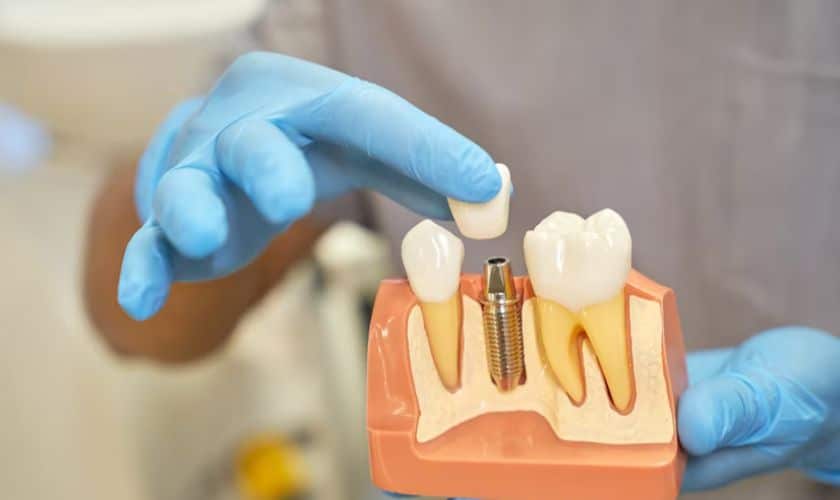
Missing teeth are a significant problem for many people, both aesthetically and functionally. Dental implant treatment addresses this issue, but it is sometimes postponed or not preferred due to misconceptions. In this article, we aim to clarify misconceptions about dental implant treatment.
What is Dental Implant Treatment?
Dental implant treatment is a surgical method for replacing missing teeth. In this treatment, titanium implants are placed in the jawbone to replace lost teeth. These implants integrate into the jawbone and take on the function of natural tooth roots. Porcelain crowns or prostheses provide both aesthetic and functional restoration, allowing the patient to regain the function and aesthetics of their natural teeth.
- The Procedure Is Very Painful
The discomfort experienced during dental implant treatment is generally minimal. Modern anesthesia techniques and surgical methods allow patients to undergo the treatment comfortably. Local anesthesia is usually administered, and the patient does not feel pain during the procedure.
Mild discomfort or swelling might occur after the procedure, but these are usually short-lived and manageable. Pain relievers and anti-inflammatory drugs can be used before and after treatment to enhance patient comfort.
- The Post-Treatment Appearance Looks Artificial
The appearance of teeth after dental implant treatment is quite natural and aesthetic. Titanium implants replace natural tooth roots and integrate firmly into the jawbone. Porcelain crowns or prostheses on them provide an aesthetic closely resembling the patient’s natural teeth.
The teeth’ color, size, and shape are also custom-designed to fit the patient’s oral and facial structure. Thus, a completely natural smile is achieved after treatment rather than an artificial appearance. These aesthetic results boost patients’ confidence and make them more comfortable in social interactions.
- It’s Only for the Elderly
Dental implant treatment is suitable for individuals of all ages without age-related restrictions. Tooth loss can occur in people of all age groups, from young adults to the elderly.
In fact, for individuals who experience tooth loss at an early age, implant treatment may be a longer-term and more robust solution compared to other alternatives. Suitability for treatment depends on the individual’s overall health and the suitability of the jawbone. Therefore, dental implant treatment is not just for the elderly but for individuals of all ages.
- It’s Very Expensive
Dental implant treatment may seem costly at first glance, but it can be more economical in the long run than other alternatives. The cost of treatment varies depending on factors such as the quality of materials used, the experience of the treating dentist, and the location of the hospital or clinic. However, considering implants’ durability and longevity, the treatment cost becomes more reasonable compared to other alternatives.
Compared to temporary solutions, implants require less maintenance and repair in the long run. Additionally, some insurance companies may partially or fully cover dental implant treatment. Therefore, although the initial cost of treatment may seem high, considering the benefits it provides in the long term, it can be viewed as an economical option.
- Short Lifespan
When properly placed and maintained, dental implants can last for many years, even a lifetime. Compared to other temporary solutions, implants are more durable and long-lasting.
Problems such as wear and decay may arise with other options over time. Dental implants function like natural teeth and fulfill their chewing function completely. Moreover, implants do not have issues like decay because they are made of titanium.
- Lengthy Recovery Time
The recovery time after dental implant treatment generally varies depending on the patient’s overall health and where the implant is placed. However, with modern surgical techniques and the development of implant materials, the recovery process has significantly accelerated.
The healing process involves integrating the implant into the jawbone and adapting to the bone tissue. This process may take a few months, but patients can typically return to normal daily activities shortly after the procedure.
Additionally, careful post-operative care and adherence to the doctor’s recommendations can expedite the healing process. Therefore, patients can achieve full recovery in a short period and start using their implants entirely.
- Complex and Detailed Post-Treatment Care
After dental implant treatment, post-treatment care is similar to caring for natural teeth and is not complex or challenging. Implants should be brushed regularly, like natural teeth and dental floss should be used. Additionally, specially designed toothbrushes and dental floss can be used for implant care. Moreover, mouthwashes recommended by your dentist can help reduce bacteria formation around the implants.
Your dentist will schedule regular appointments to check your implants. During these check-ups, the condition of the implants is evaluated, and maintenance is performed if necessary. Regular and detailed post-treatment care is essential for ensuring the long-term success of implants. With the establishment of proper care habits, this process can be easily managed, and your implants can be preserved for the long term.
There are many misconceptions about dental implant treatment. However, contrary to these misconceptions, dental implant treatment is a reliable method supported by modern surgical techniques and materials.
Misunderstandings such as the procedure being painful, achieving an artificial appearance after treatment, or the treatment being only for the elderly contradict the facts. Dental implants offer a long-term solution that restores the function and aesthetics of natural teeth. The ease of post-treatment care and the longevity of implants are also among the advantages of treatment. Given this information, individuals can consult with their dentists to determine the most suitable treatment option based on their needs and circumstances.
Types of Dental Implant Treatments
Dental implants are artificial tooth roots placed in the jawbone to replace missing teeth. There are various implant treatment options available for different cases and patient needs. Some of these options include:
Traditional Implant Treatment
This method is the most common implant treatment. Implants are surgically placed into the jawbone, and a healing period of 3-6 months is expected. After healing, prostheses (crown, bridge, or denture) are placed on the implants.
Immediate Loading Implant Treatment
This method places temporary prostheses immediately after the implants are inserted. This allows patients to have aesthetic and functional teeth without waiting for a long healing period. For immediate loading treatment to be applied, sufficient bone volume must be adequate, and the patient’s general health condition must be suitable.
Zygomatic Implant Treatment
It is a method applied to patients who do not have sufficient bone volume. Zygomatic implants are longer implants placed into the cheekbone. Thus, implant treatment can be used even if there is not enough bone volume.
All-on-4 Treatment
In this method, a fixed prosthesis is placed on four implants inserted into the jaw. All-on-4 treatment offers a fast and effective solution for patients who have lost all their teeth.
Mini Implant Treatment
These are implants of smaller sizes. They are used primarily in narrow jaws or patients with low bone volume. Mini implants are placed with less intervention compared to traditional implants.
It is essential to consult your dentist to find out which implant treatment is suitable for you. After performing an oral and dental examination, your dentist will recommend the most appropriate treatment option for you.





